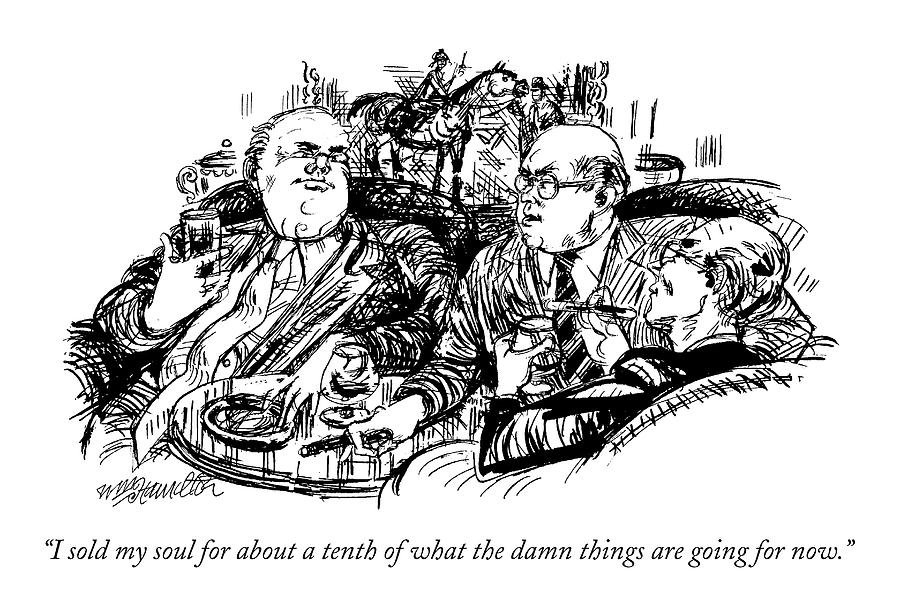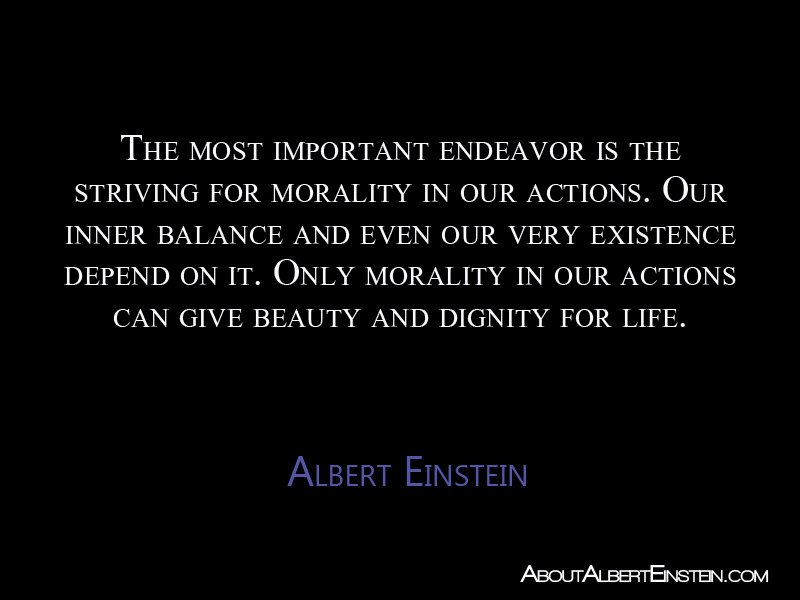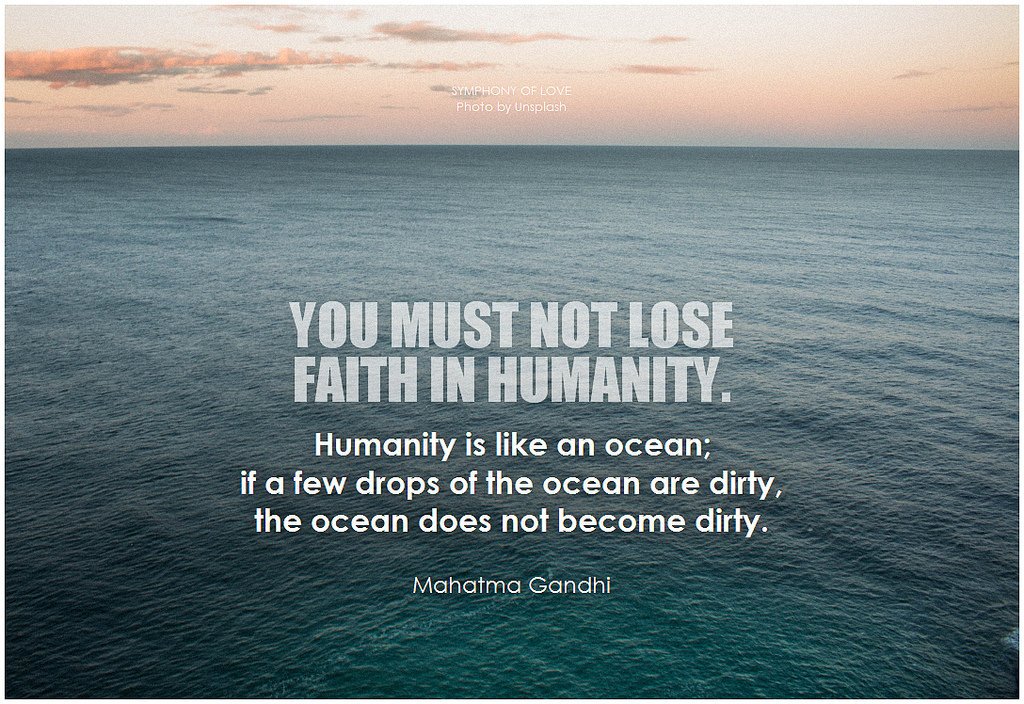Most people I know are good people. I think it's even save to say that I don't know any particularly bad or evil people, and in my daily interactions with scores of other people in my private life, at work and here on Steemit I don't hear others talk about bad or evil persons they know of.

image by WILLIAM HAMILTON - source: Conde Nast
Why then does society as a whole look so much more immoral than when I was a kid? I think the answer is best found when trying to define morality. There's of course the claim by various religions and beliefs they hold the key to what they call an "objective" moral standard, being their God, or the Word of their God. You know, a set of easy to follow rules, usually starting with "thou shalt" or the vastly more popular "thou shalt not". They claim that without a supreme being, spying and judging our every action and thought, there's just no way for us humans to decide on what's good or bad, what's right and what's not. Some believe this so much they even claim we would all devolve in a bunch of murdering, raping and pillaging barbarians if God would not exist...
I have a big problem with this approach to morality and moral behavior, even if most religious texts contain the Golden Rule which I believe is a sound rule to adhere to. It's not even that these rules are set by an imaginary supreme arbiter in the sky; it's the mere fact that we're talking about rules that irks me to no end. This is because when we do things because the rules say so we shut of our own moral compass; it makes us morally lazy. Simply said: if you donate to a charity because you believe Jesus told you to do so, because God said it's the right thing to do, who then is ultimately the good person? You or your anthropomorphized God? Same goes for secular laws by the way.
This is why I am much more comfortable with, and believe much more benefit will come from ethical systems which consider actions themselves and judge them by their consequences. Throughout human existence we have lived in groups and as such have always shared space, and way back when scarcity was a real thing, we shared much more than that. We space-sharing rational beings have had millennia of experience with watching the consequences of our actions on ourselves and the ones we share the space with. In these tribes, later to become societies, we learned that a certain type of action is beneficial to the well-being of ourselves and those around us, while other actions have the opposite effect.
If moral behavior can be defined as performing actions that increase the well-being of individuals and / or groups, and immoral behavior as actions that decrease that same well-being, I think we're pretty close to a satisfactory foundation to morality without the need for a higher being or more secular law-giving. We would have to generalize of course and leave open the possibility of many exceptions to the "rule", as any given situation is different and we have to consider "intent". Every moral judgement is therefore highly situational and demands from each of us to not be morally lazy.

image by QuotesEverlasting - source: flickr
We must generalize to come to the essentially subjective description of "well-being". Though some people might actually like pain, it's safe to say that generally speaking less pain equals more well-being. While some may actually want to die, we can generally claim that putting a bullet in your own or someone else's head is bad for their respective well-being. And we can go on: less pollution means more well-being. Less sickness and more health will have a positive effect on the well-being of individuals and societies alike. Are you beginning to see what I see? Is the immoral society beginning to take shape in your minds eye?
If we define moral behavior as that which maximizes individual and collective well-being, we're failing miserably. The simplest way for me to illustrate that is, as on so many occasions, by pointing at the results of the capitalist economy. Because like the Bible and other religious laws I criticized at the start of this post, capitalism is the prime dogma by which we lead our lives worldwide, it's a world economy after all, reigning since the first industrial revolution and claiming absolute victory after the fall of the Berlin Wall in 1989. This new world-religion of profit and money has lead us to a rather embarrassing reality: we overproduce food, enough to feed the world population twice, but manage to not feed all. We have an abundance of empty buildings in every major city, next to countless homeless people. The biggest companies are the largest polluters and the entire foundation of a growing economy rests on producing ever more waste, poverty and war; we don't build things to last, but to be replaced as soon as possible.
The accompanying individualism, paired with an essential misunderstanding of evolution theory in which "survival of the fittest" is equated with the need to be selfish has done no good either. How many big and little immoral acts do we engage in to simply not be "a thief of our own wallet"? Yep, we invent the nicest and cleverest sounding sayings to explain away our own immoral tendencies. I wrote of a giant immoral act from myself two days ago in Screwing The Customer a couple of days ago. And that's small compared to the larger picture: the fact that big companies locate their factories in countries that don't have a lot of environmental or worker-protection laws so they can underpay and over-pollute is seen as a rational and logical step in too many minds.
Like Genesis, capitalism has made us continued the ancient believe that humans are inherently bad. What used to be a mistranslation of ancient texts, resulting in the Bible's Original Sin, has been replaced by a willfully wrong interpretation of Darwin's theories that supposedly means that we're selfish survival machines. This belief, cultivated for millennia now, results in a society that has become a group of individual agents for self-satisfaction instead of a community bound by shared goals. We have forgotten what it means to share space. We don't really mind the consequences of our actions; we have laws and an overarching economic model to do that for us. And so doing we've managed to eliminate scarcity while simultaneously increasing poverty, creating enormous wealth contrasted with never before seen relative and absolute poverty.

image by BK - source: flickr
I wish we wouldn't become the bad persons the elite has always made us believe we are. This is not a conspiracy theory, just common sense and skepticism as far as I'm concerned. Biology says we're social creatures with a natural tendency to assign leaders in the group, and there's nothing wrong with that; there'll always be leaders and followers. It's when we combine that natural behavior with the unnatural concepts of rulers and ruled when problems start. We have no leaders assigned by the group, but instead have rulers that have for millennia mislead the group, the followers, the sheep, into believing they're somehow worth less and inherently evil.
My best advice would be to just realize we're all humans that are part of a bigger society and must all share one planet. Let's re-discover our humanity and start practicing some practical morality, let's train our moral skills and rely less on the rules dictated by law or religion. Try to be aware of the possible consequences on your surroundings and the people in it, of your actions and try to think of something else to do when you can reasonably assume those actions will have a negative effect on general well-being. Ask yourself "if I do this, how will it affect my world and the world".
It's not easy, but start small. Like I said at the start: 99,99 percent of people are "good". We naturally live by the golden rule because evolution has led to us being social creatures that like to live in groups. It's even hard-wired in our physical make-up: our nervous system is full of so called mirror neurons that make us "experience" what we see done to others, it's why we empathize.
With that I like to conclude today's post. Thank you all as always for wrestling through another rather heavily loaded subject. I'd like to take this opportunity to say that I didn't intend to insult anyone's feelings, but that I realize that's sometimes impossible when speaking the truth as one sees it personally. That's why "intent" matters when making moral judgments by the way. Please feel free to leave your thoughts in the comment section and discuss: there's always something new, some new perspective to learn about on these deeply human matters. Before speaking though, try to decide what to say and how to say it while keeping in mind the well-being of the ones you address. I hope this hasn't been too harmful for you all to consume, and I sincerely hope to see you all back here tomorrow! :-)

Recent articles you might be interested in:

Thanks for stopping by and reading. If you really liked this content, if you disagree (or if you do agree), please leave a comment. Of course, upvotes, follows, resteems are all greatly appreciated, but nothing brings me and you more growth than sharing our ideas. It's what Steemit is made for!


Just for Full Disclosure, I'm invested in these crypto-currencies:
Bitcoin | Litecoin | EOS | OmiseGo | FunFair | KIN | Pillar | DENT | Polymath | XDCE | 0x | Decred | Ethereum | Carmel | XYO
